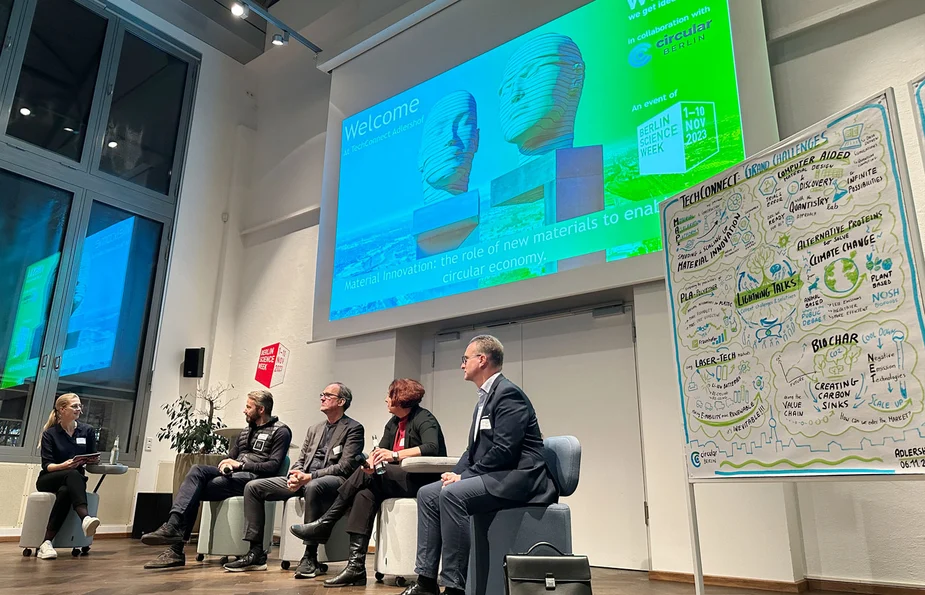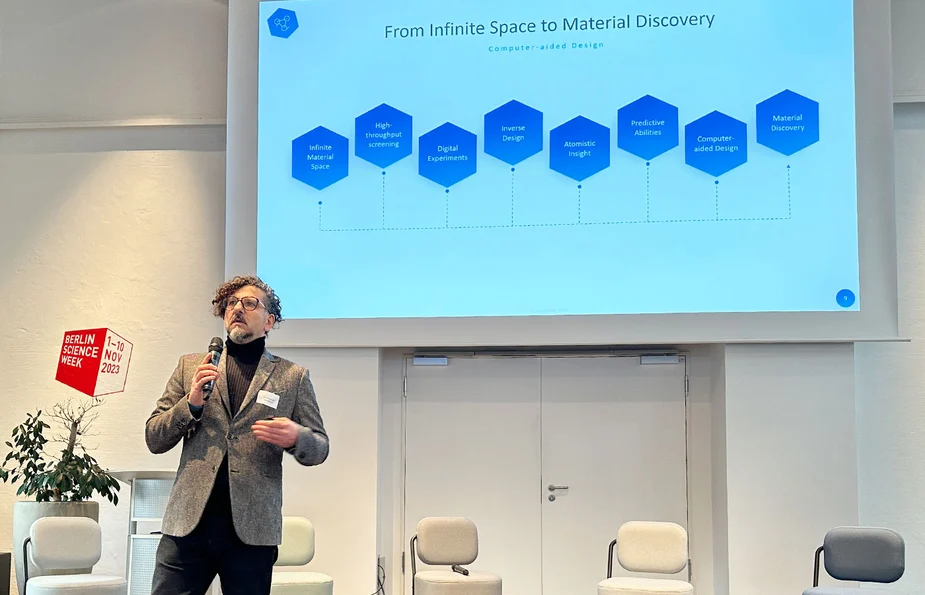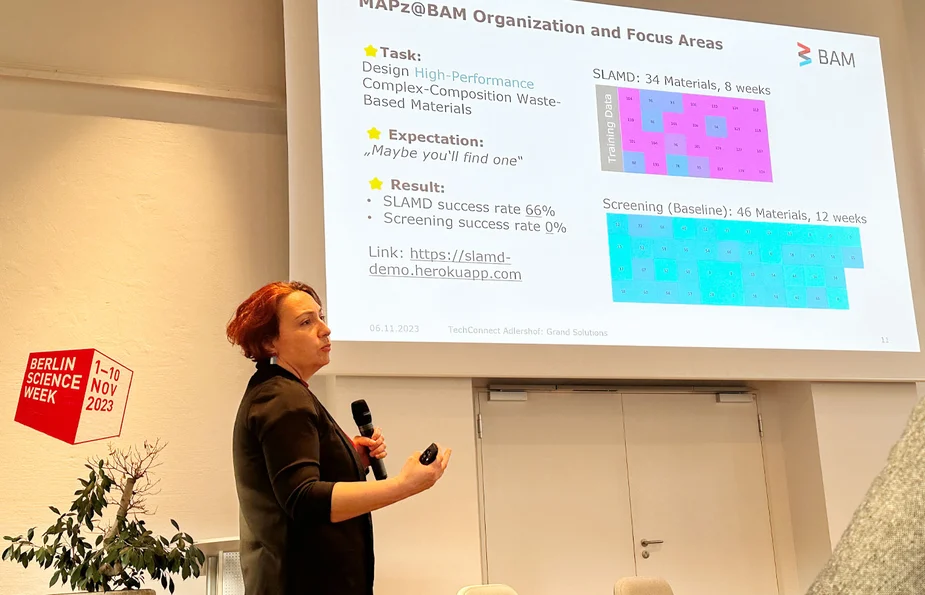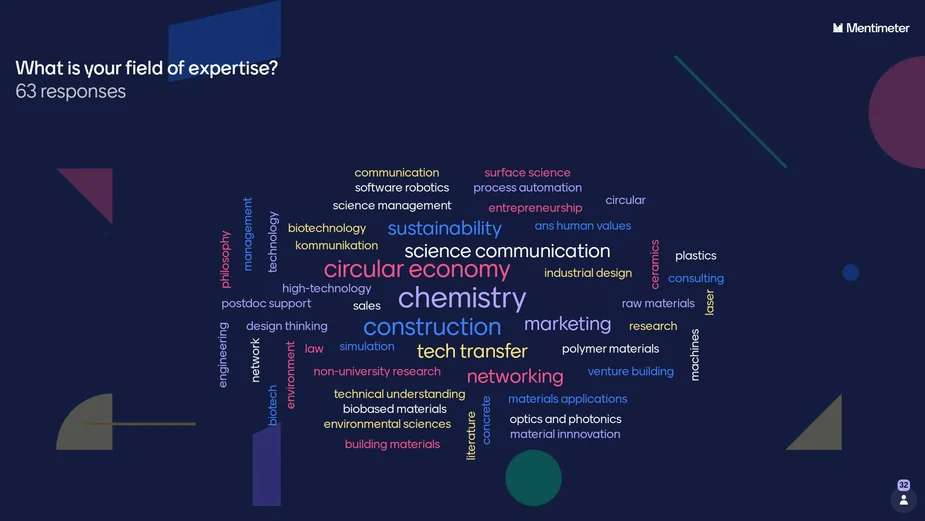Materially enabling the circular economy
At TechConnect Adlershof, scientific institutions, innovators, and companies discussed how new materials enable a circular economy
When someone like Patrick Teuffel matter-of-factly uses the words “ongoing progress” to describe the workings of his industry - instead of the ubiquitous “ongoing process” – it says very clearly something about how innovation is a natural part of that industry.
Teuffel is the founder of Circular Structural Design and Professor of Innovative Structural Design at TU Eindhoven. He was one of four panel guests who discussed material innovations for the circular economy at TechConnect Adlershof on November 6, 2023, which was part of the Berlin Science Week.
And it was precisely this spirit of innovation, which Teuffel summed up so succinctly, that could be felt from the very beginning: after a brief introduction by host Raward Chammas from WISTA, six “Lightning Talks” highlighted various individual aspects from scientific standpoints and those of businesses – as the name suggests quite short, but impressive.
“Lighting Talks” along the entire value chain
Özlem Özcan Sandikcioglu from the Federal Institute for Materials Research (BAM) started things off. She presented Material Acceleration Platforms, a kind of self-driving laboratories for research. Arturo Robertazzi from Quantistry GmbH went in a similar direction and gave insights into cloud-based simulations of chemical processes. One step further seems Nosh Biofoods, as its co-founder Tim Fronzek made clear: the Adlershof-based start-up develops alternative, meat-free proteins that go beyond traditional plant-based products.
Benjamin Rodriguez Hernandez used his research at the Fraunhofer IAP to show the audience how PLA (biodegradable plastics) can be made to mimic the properties of conventional plastics. At the other end of the chain from research to product are Robert Albrecht and Laser-Mikrotechnologie GmbH. They use lasers to improve the recycling of batteries. Henrike Röse from Carbon Instead UG, who want to decarbonize the construction industry with biochar, concluded the presentations.
Overall, the talks showed how there are innovations along the entire value chain to find new materials for a functioning circular economy. This was the declared aim of the event, which was driven by an intensive exchange between all attendees. Moderator Christine Reiß made this clear right at the start with the appeal: “We want you to engage today!”
Ideas and innovation are abundant
And there were plenty of opportunities for discussion, as the visual summary of the event by “graphic recorder” Robin Hotz showed. He highlighted one aspect of the concluding panel discussion: The “value chain” is there, now there needs to be a “value change”. He referred to a contribution by Philipp Böhm (NEEW VENTURES GmbH), among others: In his opinion, we should give things a value at the end of their life (and beyond); currently, we are not only displacing waste physically, but also mentally. No technology can do this work for us as a society.
Böhm, moderator Reiß and Patrick Teuffel were joined on the podium by Özlem Özcan Sandikcioglu (BAM) and Alexander Böker (Fraunhofer IAP). They all took a more general look at the topic and emphasized how important the political framework is, to enable innovations from research and businesses: Böker, for example, referred to the need for a higher CO2 price, Özcan Sandikcioglu mentioned the upcoming “battery passport”.
What remains in the end is the impression that there are more than enough ideas, approaches, and innovations along the entire value chain - we just have to start implementing them seriously and across all disciplines.
Contact
Rawad Chammas
WISTA Management GmbH
+49 170 4433148
chammas(at)wista.de
www.adlershof.de/en/grand-challenges
![[Translate to English:] ©WISTA Management GmbH](/fileadmin/_processed_/6/1/csm_techconnect-adlershof-1_de54f21550.webp)



